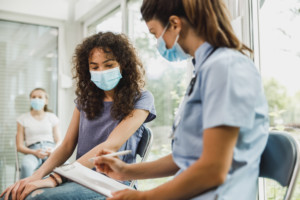“We are seeing an increase in the number of patients diagnosed with COVID-19, respiratory syncytial virus or RSV and the flu this year,” said Reyzan Shali, MD, a board-certified internist at Tri-City Primary Care. “During the pandemic, we all stayed indoors and wore masks out in public, which lowered our exposure to these types of respiratory illnesses. Since we did not build up our natural immunity to them over the past two years, we are now seeing a viral surge because we are no longer so isolated. Now, it’s more important than ever to follow three basic preventive measures to stay healthy.”
Dr. Shali recommends washing your hands, wearing a mask and getting vaccinated to reduce the risk of getting one of these viral illnesses, as well as a cold. “Each of these is mainly spread through droplets, which are expelled when a person sneezes, coughs or talks. If you touch your mouth, nose or eyes immediately after touching keyboards, doorknobs or other surfaces that have leftover droplets from someone else or shake hands with an individual who has a virus, then you may introduce the virus into your own body.”
“As we resume travel, gather in large groups and attend big events like concerts, we increase our exposure, which is why wearing a mask is still important,” added Dr. Shali. “I know that many people have vaccine fatigue but staying up-to-date with your flu and COVID-19 vaccines not only reduces your risk of getting sick, but also makes symptoms milder should you get one of these airborne diseases.”
According to WebMD and GoodRx Health, COVID-19, RSV, the flu and the common cold all have similar symptoms such as fever, cough, stuffy/runny nose and congestion. However, there are specific symptoms that differentiate each of these respiratory viruses. With COVID-19, the sudden loss of taste and smell and shortness of breath are key indicators, as fatigue, muscle pain/body aches, a sore throat and headaches overlap with the flu. “One of the most important things to pay attention to is a high fever, which is more often a symptom of COVID-19 and the flu, rather than a cold,” said Dr. Shali. “Just as important is a cough. Children and older adults with RSV have a distinctive whistle sound or wheezing to their cough and may also have trouble breathing.”
As there are overlapping similarities to symptoms, patients should be tested to determine the illness and best supportive treatment. According to LabCorp, individual at-home collection kits are available for COVID-19, the flu and RSV, as well as a single-panel test, which is available to patients through their doctor, hospital or authorized healthcare provider.
“Testing is important as all of these viruses are highly contagious,” said Dr. Shali. “Unfortunately, people may have already spread the illness before experiencing symptoms. This makes it tricky when trying to determine if you should send your child to school or attend a family gathering if a test is negative or there are no symptoms, or they have passed.” According to the Centers for Disease Control and Prevention, symptoms for COVID-19 appear two to five days after infection, one to four days after infection for the flu, and four to six days for RSV. Even someone with the common cold may be contagious one to two days prior to symptoms. “Patients with any of these viruses are also contagious for various lengths of time after symptoms develop and have subsided,” added Dr. Shali.
“For all of these respiratory illnesses, antibiotics do not work as they are viral, not bacterial infections,” said Dr. Shali. “Treatment is supportive care, meaning rest, hydration and medications like acetaminophen or ibuprofen for fever and body aches. I also encourage patients to take Vitamin C.”
“Anyone who is experiencing an airborne illness should contact their doctor,” said Dr. Shali. “At TCPC, we offer telehealth visits and open appointments spots in our schedules to be sure that patients can be seen the same day. If you or your child is experiencing shortness of breath, call us right away so we can immediately determine the best course of action. We are here to serve our community during this tripledemic, and our goal is to keep everyone healthy.”
To learn more about the Primary Care Services offered at Tri-City Medical Center, call 855-222-8262 to be referred to a Tri-City Primary Care physician.



















